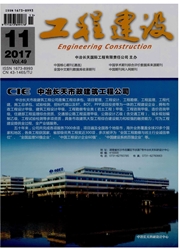

 中文摘要:
中文摘要:
通过冻融循环试验,比较不同水灰比、不同胶凝材料、不同浓度硫酸钠溶液对质量损失的影响。结果表明:相同条件下水泥砂浆试件在5%的硫酸钠溶液中进行冻融循环,其质量随冻融循环次数增加呈逐渐下降的趋势,且水灰比越大,质量损失率越大;随冻融循环次数增加,掺加粉煤灰的砂浆试件对冻融循环由抑制作用变为促进作用,而高抗硫酸盐水泥的抗冻性优于普通硅酸盐水泥;相同水灰比下普通硅酸盐砂浆试件在硫酸盐中的质量损失率比水中小,即硫酸盐中的抗冻性优于水中的抗冻性。
 英文摘要:
英文摘要:
Through freeze-thaw cycle test, the influences of different water ce- ment ratio, different cementitious materials and different concentration of sulfate solution on the mass loss were compared. The results show that, the mass of mortar specimens decreases with the increase of the number of freeze-thaw cycles in 5 % sodium sulfate solution, and the bigger the water cement ratio is, the higher the mass loss rate is. With the increase of the number of freeze-thaw cycles, the mortar specimens with pulverized fly ash become positive from passive to the freeze cycle, and the frost re- sistance of high sulfate resistant cement is better than that of ordinary Portland cement. The mass loss of Ordinary Portland cement mortar specimens is lower than that in water at the same water cement ratio, that is, the frost resistance in sulfate solution is better than that in water.
 同期刊论文项目
同期刊论文项目
 同项目期刊论文
同项目期刊论文
 期刊信息
期刊信息
